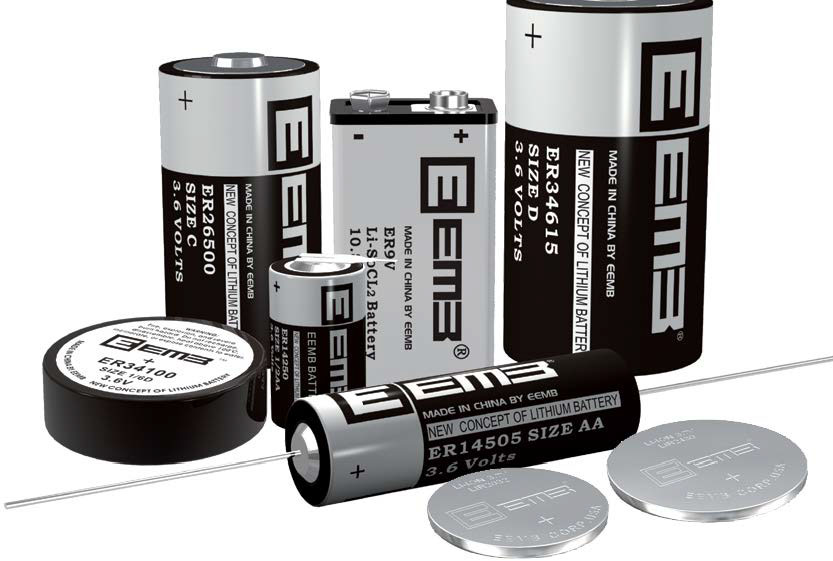I. Lithium Primary Batteries
Alkaline Batteries
- consumer battery
- cell voltage 1,5V
- low capacity

Li-lron Disulfide Batteries
- consumer industrial mix
- consumer industrial mix
- cell voltage 1,2V
- higher capacity compared to alkaline
- easy replacement for alkaline
- longer life time in comparison with alkaline
Li-SoCl2 Batteries – Lithium Thionyl Chloride
- high operating voltage, stable du ring most of the application lifetime
- high operating voltage, stable du ring most of the application lifetime
- wide temperature range from -55°C (-G0C° ) to +85C0
- superior shelf life and reliability: over 15 years shelf life at room temperature with a self-discharge rate lower than 1% per year
- energy type is bobbin structured and best suited for low discharge current. lt may require activation before medium currents can be delivered
- high power type is spiral structured and best suited for high continuous and pulse current discharges. lt may require activation before medium currents can be delivered
- high temperature type up to +150C0
Li-Mn02 Batteries – Lithium Manganese Dioxide
- high operating voltage, stable du ring most of the application lifetime
- high operating voltage, stable du ring most of the application lifetime
- wide Temperature Range from -40°C to +85C°
- low self-discharge rate is less than 1% per year at room temperature
- energy type is bobbin structured and best suited for low discharge current
- high Power type is spiral structured and best suited for high current discharge for both continuous & pulse currents
- button Types available

Application Examples
- Metering (Water, electric, Gas) Toll collect
- Smoke detector
- Alarm systems
- Back Up Power
- Electronic locks (door systems) Cameras with flash light
- Watches
- Electronic keys for automobiles Sensors
- Taxi meter
- Life jackets
- RFID Tags
- E-Call systems
Our Capabilities
- Battery packs
- Special wires and connectors
- Safety electronic for primary cells
Lithium Secondary Batteries “Akkus”
Lead Acid
- 1,2V cell voltage
- big size and high weight
- no transport restrictions
- short life time in comparison with other technologies
- 200-500 cycles with 50% DOD
Nickel Metal hydride
- 1,2V cell voltage
- replacement for NiCd
- 40% more energy density than NiCd
- lifetime of 500-1000 cycles
Lithium Ion
- 3,2V to 4,2V cell voltage
- different chemistries
- safety electronic and BMS needed
- no memory effect
- transport restrictions
- limited storage time (deep discharge)
Supercapacitors
- 2,5V to 3,0V cell voltage
- Lifetime >500.000 cycles
- excellent deep temperature performance (-40°)
- fast charging – just in seconds
- high current capability
Nickel Cadmium
- 1,2V cell voltage
- easy to eh arge
- restricted in Europe
- good deep temperature performance
Lithium Supercapacitors – Hybrid
- 3,7V cell voltage
- hybrid type
- low leakage current
Battery Pack Design
- design by lneltro possible
- PCM (protection)
- BMS (protection, balancing, communication, … )
- UN38.3 certification for transport
- IEC62133 certification
- UL certification
Cell mechanics
- pouch cells
- cylindrical cells
- prismatic cells
- button cells
- radial cells
- screw types

Energy Storage Systems
Intelligent energy storage systems are able to store energy from solar panels or from the grid. Two different solutions are possible.
- ESS storage battery -> an inverter is needed
- ESS storage system -> everything is included
The device can be connected directly to the Solar Panel, to the grid or both.
Different sizes are available:
- Portable solutions (128Wh, 256Wh and 512Wh)
- Mobile solutions (768Wh and 1280Wh)
- Fixed solutions (2KWh, 4KWh, 5KWh, 8KWh, 16KWh … )
Solar cells
Different technologies, formats and sizes are available:
- standard mono- and polycrystalline solar cells from 5W to 310W
- standard mono- and polycrystalline solar cells from 5W to 310W
- customized mini solar cells from 0,lW to 5W
- silicon thin film solar panels for indoor and outdoor applications
- super thin film flexible solar cells
- customized sizes and formats
Certifications
UN38.3 CertiFication
This certification is mandatory for transportation. Each battery cell and battery pack has to be tested and certified by an official institute. Without this certificate shipment is prohibited.
For this certificate is needed:
- 20 pcs. samples
- lead time is 8-10 weeks excluding sample production
The certificate consists of detailed test results including pictures of the battery.
IEC62133 Battery CertiFication
Tests are similar than UN38.3 but include additional tests that are required to obtain IEC62133 certification.
For this certificate is needed:
- 20 pcs. samples
- lead time is around 12 weeks excluding sample production
The certificate consists of detailed test results including pictures of the battery. The IEC63133 certification can be done in combination with UN38.3 certification.
Transport
- every tra nsport requires the UN38.3 certification and MSDS sheet
- regulations for air and sea shipments are different
- UN number and classification is needed for shipment. For example UN3480 Section Pl966 (please ask for details)
Storage
- Limited storage time due to self-discharge
- Storage conditions are defined in the datasheets, normally room temperature (please ask for details)
- lneltro can provide specific logistic solutions
Recycling
- recycling of lndustrial batteries is ma ndatory
- industrial batteries must be reported to government, if country of production is from outside the EU
- lneltro can offer an individual solution for all these topics

